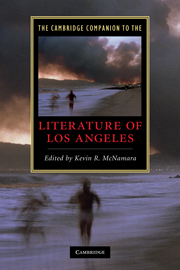Book contents
- Frontmatter
- Introduction: landmarks
- 1 The literature of the Californios
- 2 The Anglo invention of Los Angeles
- 3 LA fiction through mid-century
- 4 British expatriates and German exiles in 1930s-1940s Los Angeles
- 5 Postwar Los Angeles: suburban Eden and the fall into history
- 6 Los Angeles and the African-American literary imagination
- 7 Pacific Rim city: Asian-American and Latino literature
- 8 The literature of urban rebellion
- 9 City of sleuths
- 10 Los Angeles’ science fiction futures
- 11 Hollywood fictions
- 12 The Southland on screen
- 13 Scenes and movements in Southern California poetry
- 14 Surf, sagebrush, and cement rivers: Reimagining nature in Los Angeles
- 15 Essaying Los Angeles
- Guide to further reading
- Index
4 - British expatriates and German exiles in 1930s-1940s Los Angeles
Published online by Cambridge University Press: 28 May 2010
- Frontmatter
- Introduction: landmarks
- 1 The literature of the Californios
- 2 The Anglo invention of Los Angeles
- 3 LA fiction through mid-century
- 4 British expatriates and German exiles in 1930s-1940s Los Angeles
- 5 Postwar Los Angeles: suburban Eden and the fall into history
- 6 Los Angeles and the African-American literary imagination
- 7 Pacific Rim city: Asian-American and Latino literature
- 8 The literature of urban rebellion
- 9 City of sleuths
- 10 Los Angeles’ science fiction futures
- 11 Hollywood fictions
- 12 The Southland on screen
- 13 Scenes and movements in Southern California poetry
- 14 Surf, sagebrush, and cement rivers: Reimagining nature in Los Angeles
- 15 Essaying Los Angeles
- Guide to further reading
- Index
Summary
The growth of Hollywood attracted writers from around the world, soon joined by the wave of refugees fleeing Hitler. The cosmopolitan colonies of British expatriates and German (and Austrian) exiles made noteworthy contributions to the literary representation of Los Angeles, often placing the urban space of their new home in relation to the memory of their cultures of origin. Prominent British novelist Aldous Huxley's first impression of Los Angeles in 1926 was negative: “thought is barred in this City of Dreadful Joy and conversation is unknown.” Yet returning in 1937 on a speaking tour with the historian and philosopher Gerald Heard, he responded well enough to settle in Hollywood, before moving to Llano in 1940. The anxieties set out earlier in his famous dystopia, Brave New World (1932), evolved in his later writing, combining biology and science with Indian spirituality, meditation, and drug use. In Los Angeles, European culture found Asian religion: Huxley met proponents of expanded spiritual consciousness such as Jiddu Krishnamurti (who had moved to Ojai in 1922) as well as Swami Prabhavananda, founder of the Vedanta Society of Southern California (1930). After Many a Summer Dies the Swan (1939), the first of Huxley's five novels from his LA years, opens with an abrupt encounter between Europe and America, as Jeremy Pordage, an Englishman carrying a volume of Wordsworth, arrives to be greeted by “a coloured chauffeur in a grey uniform with a carnation in his button-hole.”
- Type
- Chapter
- Information
- The Cambridge Companion to the Literature of Los Angeles , pp. 49 - 58Publisher: Cambridge University PressPrint publication year: 2010
- 1
- Cited by



